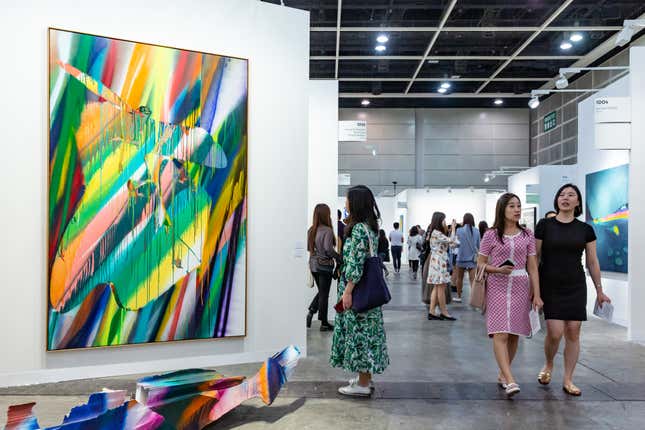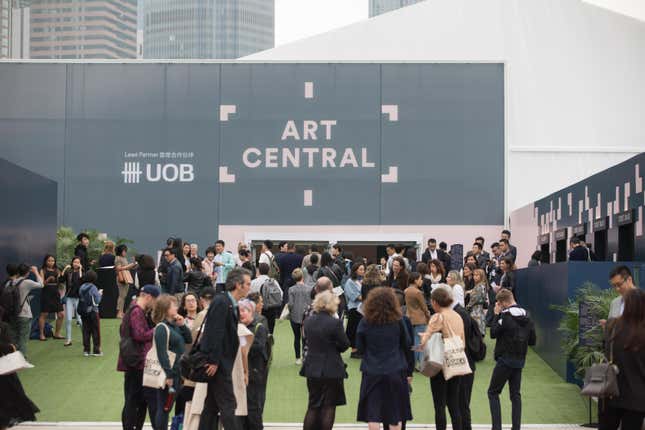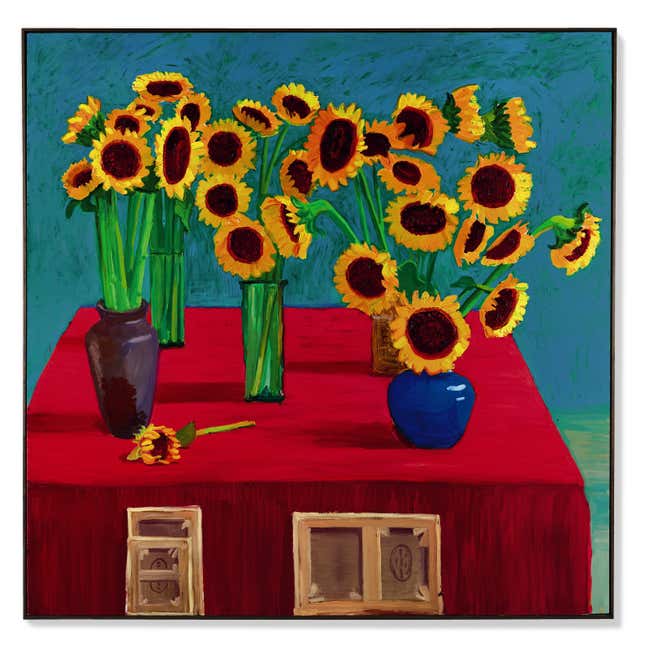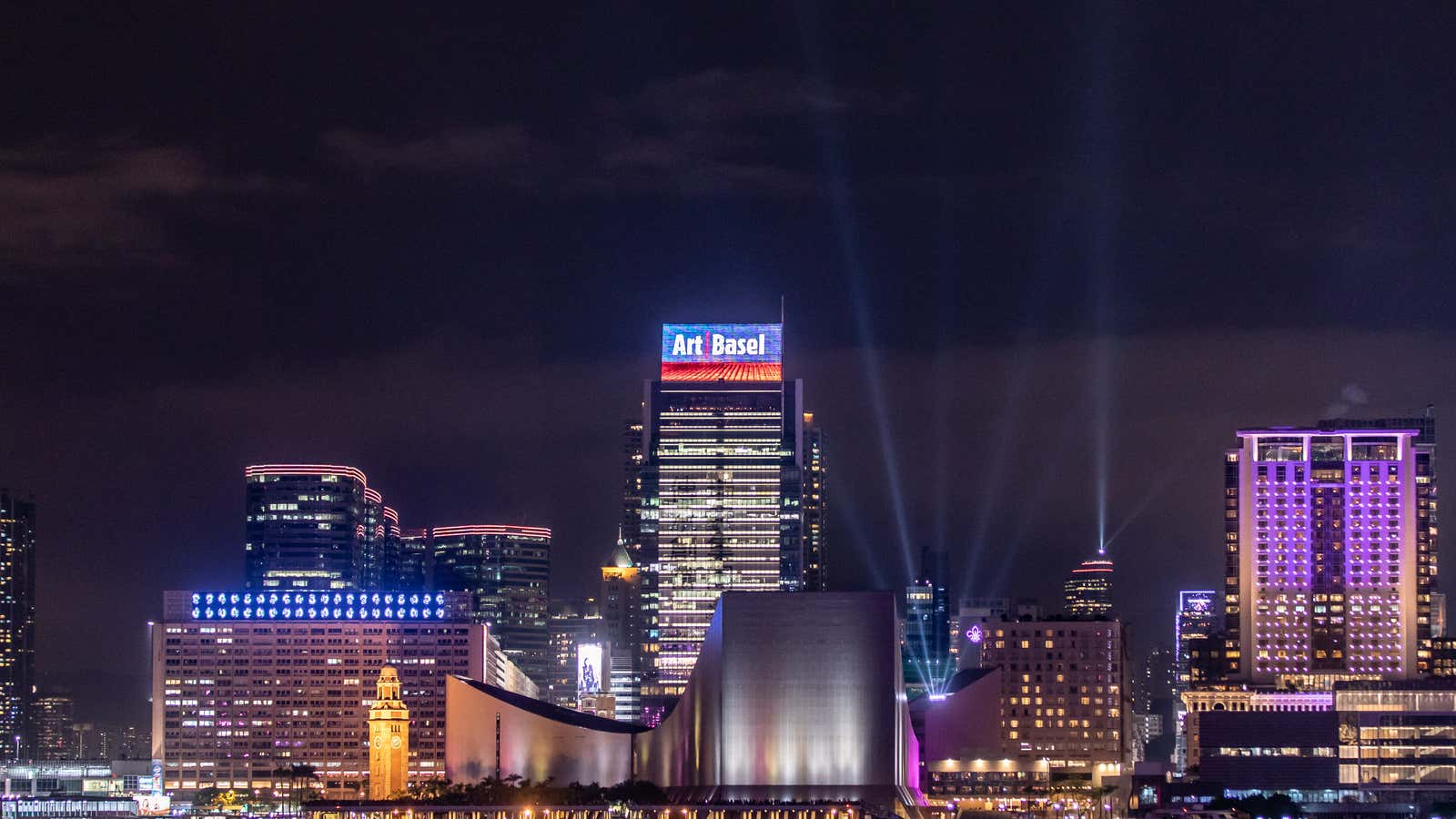Art Basel and Art Central, two of the biggest Hong Kong art events in Asia, both announced today (Feb. 7) they would cancel this year’s edition of their fairs due to the novel coronavirus outbreak.
Concerns over whether the March events would go ahead began mounting during the ongoing Hong Kong protests that started last June. But in the end, it was the virus outbreak, which has infected more than 31,000 in mainland China and claimed close to 640 lives since it began in December, that forced fair organizers to finally call off the events.
Art Basel said in a statement that the decision to cancel the Hong Kong fair, which was scheduled to take place from March 19 to March 21, was made after the World Health Organization declared the outbreak a global health emergency last week. Since then, a number of airlines have suspended service to the city. The organizers cited a number of factors for the final decision, including “fundamental concern for the health and safety of all those working at and attending the fair; the severe logistical challenges facing the build-out and transit of artwork to the show; and the escalating difficulties complicating international travel.”
“We explored every other possible option before doing so… We are acutely aware of the important role that the fair plays within the region’s cultural scenes and for our galleries, both in Asia and across the globe,” said Marc Spiegler, global director of Art Basel. “Unfortunately the sudden outbreak and rapid spread of the novel coronavirus radically changed the situation.”
It’s not the first time Art Basel has canceled an edition. In 2001, organizers postponed the inaugural edition of Art Basel Miami Beach in the aftermath of the Sept. 11 terror attacks. Fair organizers anticipated a loss of around $4 million back then. It is uncertain how much the Hong Kong cancellation will cost Art Basel’s parent, the Swiss MCH Group. The event will return to Hong Kong in March 2021.

Hours after Art Basel announced its decision, satellite fair Art Central, which was scheduled to coincide with Art Basel, also said it would cancel due to the virus.
“The uncertainty has made it increasingly untenable to guarantee the safety and well-being of the public,” Art Central said in a statement.
The Hong Kong government already closed all its cultural venues in late January to minimize mass crowd gathering to curb the virus.
Last year, Art Basel in Hong Kong attracted 88,000 visitors while Art Central saw 37,000, its organizers said. Prior to the cancellation, more than 200 galleries from 31 countries signed up for the 2020 edition of Art Basel in Hong Kong, and Art Central had a line up of 80 galleries.
Recent travel restrictions have made it difficult for overseas collectors and dealers to get to the city. Hong Kong has closed a number of land crossings, and suspended rail links with the mainland. It will also require all travelers from mainland China to be placed under a mandatory 14-day quarantine, which will stop collectors traveling from mainland China—a major source of income for galleries showing at Art Basel in Hong Kong. The number of visitors from mainland China already plunged by 56 percent last November, during the peak of the Hong Kong protests, to a new low of 2.65 million compared with the same period in 2018 .
American Airlines and United Airlines have both canceled flights to Hong Kong amid the coronavirus outbreak. The US has alerted Americans to “exercise increased caution” traveling to Hong Kong. Other territories such as Japan and Taiwan—both important bases for art collectors in the region—have also upgraded their level of travel warnings to Hong Kong.

A handful of international galleries had already withdrawn from Art Basel’s Hong Kong fair earlier due to concerns over the potential disruptions caused by the Hong Kong protests. But Art Basel’s management had been reassuring exhibitors from around the world, even offering various degrees of concessions. Some overseas galleries were still committed to the Hong Kong fair last year, believing showing in Hong Kong was a way to support the city during the political turmoil. Last month, however, 24 prominent participating galleries including Levy Gorvy and Lisson Gallery, which opened outposts in Hong Kong and Shanghai last year respectively, claimed that artists were unwilling to show their works at the Hong Kong fair, because exhibiting in a place facing increasing control from Beijing was “inconsistent with their core belief in the freedom of expression.”
Art Basel’s statement did not mention the Hong Kong protests as part of its calculus for canceling, and fair organizers were still actively making plans and programs with partners for the Hong Kong show in January.
“The protest movement had little, if any direct effect on the art market in Hong Kong. Galleries still had successful exhibitions and auctions did extremely well,” said Fred Scholle, founder Galerie du Monde, one of Hong Kong’s oldest art galleries.
But things took a different turn towards the end of January as information about the coronavirus outbreak began to gain global attention, and many prominent international art dealers called for the cancellation of the fair.
“The situation in Hong Kong, due to inept handling by the government, has caused anxiety and extreme concern, which has affected all business, including the art business. Without ensuring that Hong Kong is a safe place to go… this will scare away tourists including collectors of art,” said Scholle.
Many in Hong Kong believe the government should have taken more stringent travel restrictions on mainland travelers earlier, and even barred all travel from the mainland.
Galleries in Hong Kong had nevertheless hoped the fair would continue and some said Western art dealers were taking the opportunity to milk discounts and pull out of Art Basel amid a pessimistic business climate. “Simply put, what they are afraid of is not pandemic or blood on the street. It’s empty booths and lack of fast cash,” said Laure Raibaut, an independent art consultant and curator based in Hong Kong.

Despite a grim outlook, some local galleries plan to continue to run exhibitions, such as A2Z Art Gallery, which will go ahead with an exhibition of Japanese artist Tatsuhito Horikoshi on Feb. 8. Goethe-Institut Hong Kong will also stage the solo exhibition of Berlin-based Hong Kong artist Carla Chan from Feb. 7 to March 9. Contemporary by Angela Li also announced a new solo exhibition of Hong Kong artist Angela Yuen from February 13 onwards. However the opening receptions of these shows have been canceled or rescheduled.
Sotheby’s will continue with its spring Hong Kong sales. The auction house has announced that its Hong Kong contemporary art evening sale will go ahead on April 6 with David Hockney’s 30 Sunflowers as the main event.
